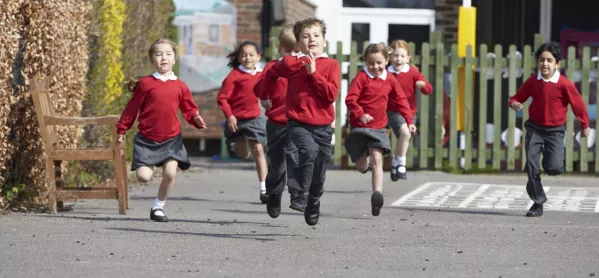Catch-up rhetoric putting ‘huge pressure’ on children

Children are being put under a “huge” pressure by the narrative that pupils need to catch up with lost learning, educational psychologists have warned.
Young people should be supported through socialisation and play if the government decides to extend the amount of time that they spend in school, the British Psychological Society (BPS) has urged.
Related: Catch-up tsar wants teachers to increase learning time
Opinion: Covid catch-up can’t take tired teachers for granted
Sir Kevan Collins: Who is the new Covid catch-up tsar?
News: Will Covid rates be safe for 8 March opening?
Prime minister Boris Johnson has appointed Sir Kevan Collins as the education recovery commissioner to oversee the government’s catch-up programme for children whose learning has been disrupted by Covid-19.
Educational psychologists are urging the government to reconsider its focus on the idea that children and young people need to “catch up” on their education following school closures due to the pandemic.
Instead, they argue that supporting the wellbeing needs of all children should be a priority.
The plea comes as the prime minister, Boris Johnson, is due to set out his “road map” for easing the lockdown in England later today, with the aim of first reopening schools.
Dr Dan O’Hare, co-chair of the BPS division of educational and child psychology, said: “It’s absolutely understandable that parents and caregivers are concerned that children have been missing out on many aspects of their formal education over the past year.
“However, the notion that children need to catch up or are ‘behind’ at school due to the pandemic reinforces the idea that children have ‘one shot’ at their education and puts them under even more pressure to perform academically after what has been a challenging and unprecedented time for everyone.”
The government is said to be considering a number of options - including summer schools, extended school days and shorter summer holidays - as part of its catch-up plans for pupils who have missed out.
But educational psychologists are instead advocating for a phased return to regular schooling, combined with a quality-over-quantity approach to learning.
Dr O’Hare told the PA media news agency: “The pandemic has disrupted all aspects of life and it’s unrealistic to expect children who have lived through this disruption to settle down into additional formal learning after the experiences they’ve had.
“Formal lessons must, of course, continue but we shouldn’t simply expect children and young people to pick up where they’ve left off and ‘catch up’ immediately on any gaps in their learning.
“This places huge and unnecessary pressure on children who have been through an extraordinary and potentially stressful time.”
Dr O’Hare said creating the time and space for children to express themselves through play is a “useful tool” to help them process what’s been happening.
“Whatever a child or young person’s circumstances, we can’t assume that the right thing to support their recovery and wellbeing is for them to be in lessons for longer each day,” he added.
Sir Kevan has previously said extra hours for sport, music and drama - alongside additional time for academic study - will be needed to help children catch up following months of disruption.
Last week, Tory MP Robert Halfon, the chairman of the Education Select Committee, said catch-up should “not just be about algebra and Shakespeare” as children’s mental health had become “fragile”.
Mr Halfon said an extension of the school day - for physical activity, mental health support and tuition - would support children’s “broader recovery”.
Register with Tes and you can read two free articles every month plus you'll have access to our range of award-winning newsletters.
Keep reading with our special offer!
You’ve reached your limit of free articles this month.
- Unlimited access to all Tes magazine content
- Save your favourite articles and gift them to your colleagues
- Exclusive subscriber-only stories
- Over 200,000 archived articles
- Unlimited access to all Tes magazine content
- Save your favourite articles and gift them to your colleagues
- Exclusive subscriber-only stories
- Over 200,000 archived articles
topics in this article



